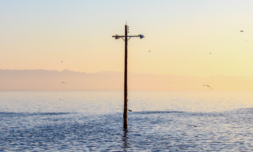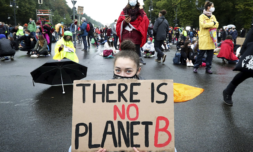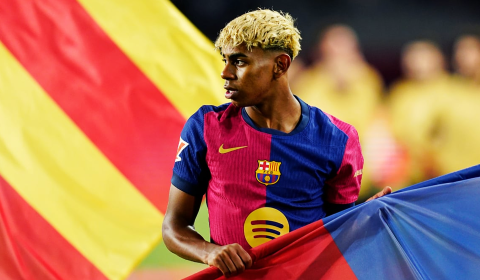We spoke to Force of Nature’s founder, Clover Hogan, about what world leaders should be focusing on at this year’s summit and how we, as individuals, can guarantee their conversations translate into tangible action.
At just 11-years-old, Clover Hogan declared herself an environmentalist.
Ever since, she’s been working tirelessly with her organisation Force of Nature to mobilise change by empowering young people to step up rather than shut down in the face of the climate crisis.
At a time as nail-biting as COP27 – following decades of failed promises and with an increasingly uncertain future on the horizon – she believes we must channel our emotion into action and come together as a community so that world leaders will truly listen and, hopefully, get things done.
We sat down with Clover yesterday to learn more.
View this post on Instagram
Thred: COP is in its 27th year, yet world leaders are still failing to treat the climate emergency like an emergency. How efficient do you consider the solutions that have been presented so far?
Clover: Because certain solutions get a disproportionate amount of air time, we talk a lot about some of the technological solutions that are going to ‘save us’ without necessarily getting to the heart of the crisis. For example, you might hear about carbon capture technology without any acknowledgement of the role of trees (which are the best carbon capturing tech we have) or the importance of restoring and protecting nature. And critically, I think one thing that often gets missed out is the role of people. It’s really easy to talk about environmental and social justice as two separate things, but we can’t protect nature without building fair and equitable communities. A big focus at the moment is loss and damage. There’s a certain degree of climate collapse that’s already locked in because of historic emissions meaning that countries – largely in the global south – are already locked into the repercussions of this. Those, like Pakistan which this year has witnessed the displacement of millions due to catastrophic flooding, which have contributed the least to this issue. They are the ones that need to be supported by the countries with the resources and wealth to fund a just transition. At COP26, funding was pledged, but it still hasn’t materialised.
This year we’re asking to see the money that was promised.
Thred: What was your main takeaway from last year’s summit and what improvements do you wish to see reflected at this year’s after the many climate catastrophes we’ve witnessed since?
Clover: Last year we saw a lot of representation of civil society and young people, yet we’re still hearing from a lot of those voices in a tokenising way. As a young activist, you often see yourself either being invited into the room and being the only young person there or not actually involved in the decision-making process whatsoever. It’s not enough anymore to just give young people a microphone or even a seat at the table. Young people are the ones inheriting this. So are frontline communities, Indigenous communities who need to be involved in the decisions that are ultimately affecting us. Unfortunately, global leaders today are disproportionately pale, male, and stale. Older, white, men who are making decisions they’re potentially not even going to live long enough to see the consequences of. We need women at the table. We need young people. We need frontline communities.
Thred: In the context of previous efforts (or lack thereof), do you deem the goals outlined so far within reach or too ambitious? What should we measure the success of discussions by?
Clover: Even if a lot of world leaders are in denial, the urgency of these solutions is hard to ignore. The really scary thing right now is that according to most of the recent UN research that’s come out, there is no viable pathway to 1.5 degrees which, as we know, is a climate catastrophe tipping point. We’re going to see runaway climate change in many parts of the world if we fail to limit emissions and that’s terrifying because even many of the global commitments that have been made so far don’t put us on that path – let alone action. This being said, I don’t think it’s effective to lean into the doomism and despair of ‘it’s too late’ because that’s a privileged response. There are already so many people living through climate change, already being displaced, already losing their lives and their livelihoods. They don’t have a choice to say it’s too late or too far gone. For them, it’s do or die.
Thred: How can we (as activists and individuals committed to the cause) be amplifying the voices of frontline communities – those most disproportionately impacted by the crisis?
Clover: For one, it starts with acknowledging your own privilege. I’m originally from Australia, now I live in the UK. Both of these nations have colonisation in their history. These countries are wealthy because they’ve extracted it from the global south – which is now bearing the brunt of the climate crisis.
On this note, it’s essential we recognise our history. That we acknowledge the climate crisis is a symptom of a system that has extracted values from these communities. One that’s also failed to pay reparations or loss and damage.
Secondly, we need to constantly make sure we’re opening the door behind us, uplifting the voices of others. This is why so much of what we do at Force of Nature is not solely about helping young people translate eco-anxiety into action, but about helping them develop the skills to make a real difference in the world. We do this with a whole host of training sessions. These range from showing young people how to speak up – to use communication as a tool for change – to teaching them how to critically advise decision-makers on business and policy which is where a lot of the incumbent power currently lies.
From there, we create opportunities to ensure those young people have a seat at the table. We acknowledge the influence and resources we have and assess how we can best distribute that to ensure the voices that need amplifying are being amplified. We’re mobilising mindsets for action.





















